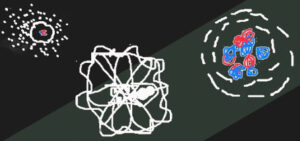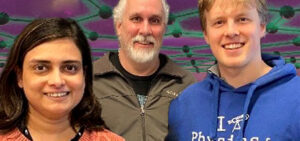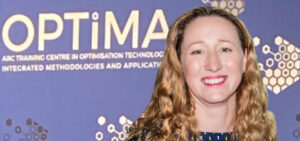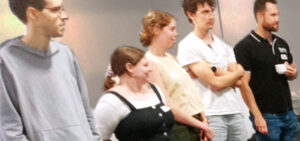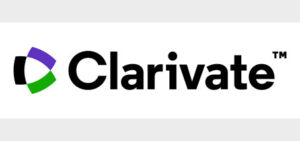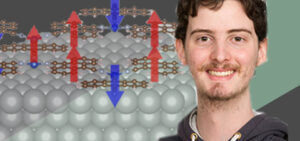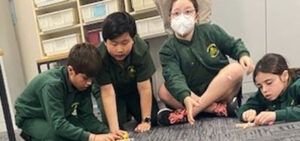Engage
See news from around FLEET, below
Catch up on all past issues of FLEET News newsletter
FLEET News
FLEET funding is supporting the next step in possible translation of thermoelectrics research towards commercialisation in future generators, electronics, vehicles, human-wearable and environmental sensors, and smart electronics Thermoelectric materials offer potential solutions to heat-management challenges common to many electronics technologies. Thermoelectrics are solid-state semiconductors that can convert heat gradients into useful electricity (known as the Seebeck effect). They can also …
Liquid metals are enigmatic metallic solvents. A new UNSW-led study of metallic crystals growing in a liquid metal solvent finds similarities and differences between liquid-metal solvents and more-familiar crystal-growth environments (such as water or the atmosphere) in which snowflakes or crystals of dissolved substances form. We can dissolve a large amount of sugar in water at high temperatures. But as …
A FLEET Primary School pilot workshop showed primary students can learn and conceptualize quantum physics and are adept at the Mexican wave. Meanwhile, 155 Hughesdale Primary School students got their first introduction to quantum physics. The year 5 and 6 students explored the quantum atomic model via role-playing activities, applying this to understand how electricity and resistance work at the …
Ultra-thin, liquid-metal-printed oxide can improve performance of your transistor by suppressing vibrational resistance Counterintuitively, this occurs by adding extra phonons (vibrations) into the system This oxide can protect your transistor against further processing Monash University researchers have demonstrated a new, counterintuitive way to protect atomically-thin electronics – adding vibrations, to reduce vibrations. By ‘squeezing’ a thin droplet of liquid gallium, …
Hi, I’m Charlotte! At FLEET I was the Executive Officer working as part of the Business Team. I really enjoyed the variety in the job – no two days were ever the same. These days, I’m the Business Manager for an ARC Industrial Transformation Training Centre, OPTIMA. Which mostly means I’m a project manager. The Centre runs for five years …
“It’s interesting to consider how to hold ourselves accountable to the taxpayers that ultimately fund scientific research.” Early-career researchers from two Centres of Excellence gathered in Queensland this month, learning how to better translate their scientific discoveries to make an impact. The focus of Idea Factory 2022 was expanded to develop a wider understanding of research translation, the translation/commercialisation ecosystem, …
FLEET PhD candidate Maedehsadat Mousavi’s has reported in following attending the Sunrise innovation festival, building on her experiences at the EQUS-FLEET Idea Factory: “Previously, I would have never considered starting my own company or launching a start-up, but now I can see myself considering this future, and how an entrepreneur can have an impact on the world.” FLEET HDR students …
FLEET Translation funding is progressing zinc-ion battery technology, which offers decreased costs, safety, and improved environmental outcomes. Current commercial batteries are primarily based on lithium-ion technology, which is expensive and has significant safety concerns owing to incorporation of flammable organic materials. The proposed aqueous zinc-ion battery technology boasts improved safety (no toxic or flammable components), low-cost manufacturing, and recyclability. The …
Theoretical physicist and FLEET AI Karen Livesey (University of Newcastle) has today been announced as one of Australia’s newest Superstars of STEM. She is one of 60 diverse, brilliant scientists, technologists, engineers and mathematicians who want to step into the media spotlight as STEM experts – officially announced today by the Minister for Industry and Science, Ed Husic. Dr Karen …
Congratulations to FLEET’s Kourosh Kalantar-zadeh and Stefan Maier, named in the top 1% by citations in their fields. The Clarivate Analytics list identifies researchers ranking in the top 1% by citations for their field. The citation identifies influential researchers as determined by their peers around the globe – those who have consistently won recognition in the form of high citation …
2D oxide-based LED encapsulation extending device lifetime FLEET translation funding is supporting the next step in a liquid-metal printing application with significant commercial promise, in a project being led by RMIT PhD candidate Patjaree Aukarasereenont. Light-emitting diodes (LEDs) play a crucial role in modern society – from mobile phones to LED billboards and home lighting, LEDs are ubiquitous. There are, …
How substrates influence magnetism in 2D materials Interaction-induced magnetism in metal-organic frameworks on substrates A new study at Monash University illustrates how substrates affect strong electronic interactions in two-dimensional metal-organic frameworks. Materials with strong electronic interactions can have applications in energy-efficient electronics. When these materials are placed on a substrate, their electronic properties are changed by charge transfer, strain, and …
Gold may hold the key to unlocking an elusive but highly desirable reaction pathway. A new Australian-led stud finds gold atoms could be key to unlocking organic reactions. Organic molecules are the building blocks for materials we use every day – from our clothes and coffee cups to the screen displays of our phones. Controlling reactions of these organic molecules …
FLEET has made the following submission towards the proposed framework of Australia’s National Quantum Strategy. See Consultation Paper. The ARC Centre of Excellence in Future Low-Energy Electronics Technologies (FLEET; fleet.org.au) is a collaboration between Monash University, Australian National University, University of New South Wales, University of Queensland, RMIT, Swinburne University of Technology, and University of Wollongong, comprising around 200 leading …
By using and modifying catapults made from icy pole sticks and rubber bands, 270 primary students from Hughesdale Primary school learned about forces and energy and thought critically about FLEET’s research and why we are trying to develop energy efficient electronics. FLEET developed the Forces and energy workshop for Years 4-7 based on pilot workshops run with primary schools in …



